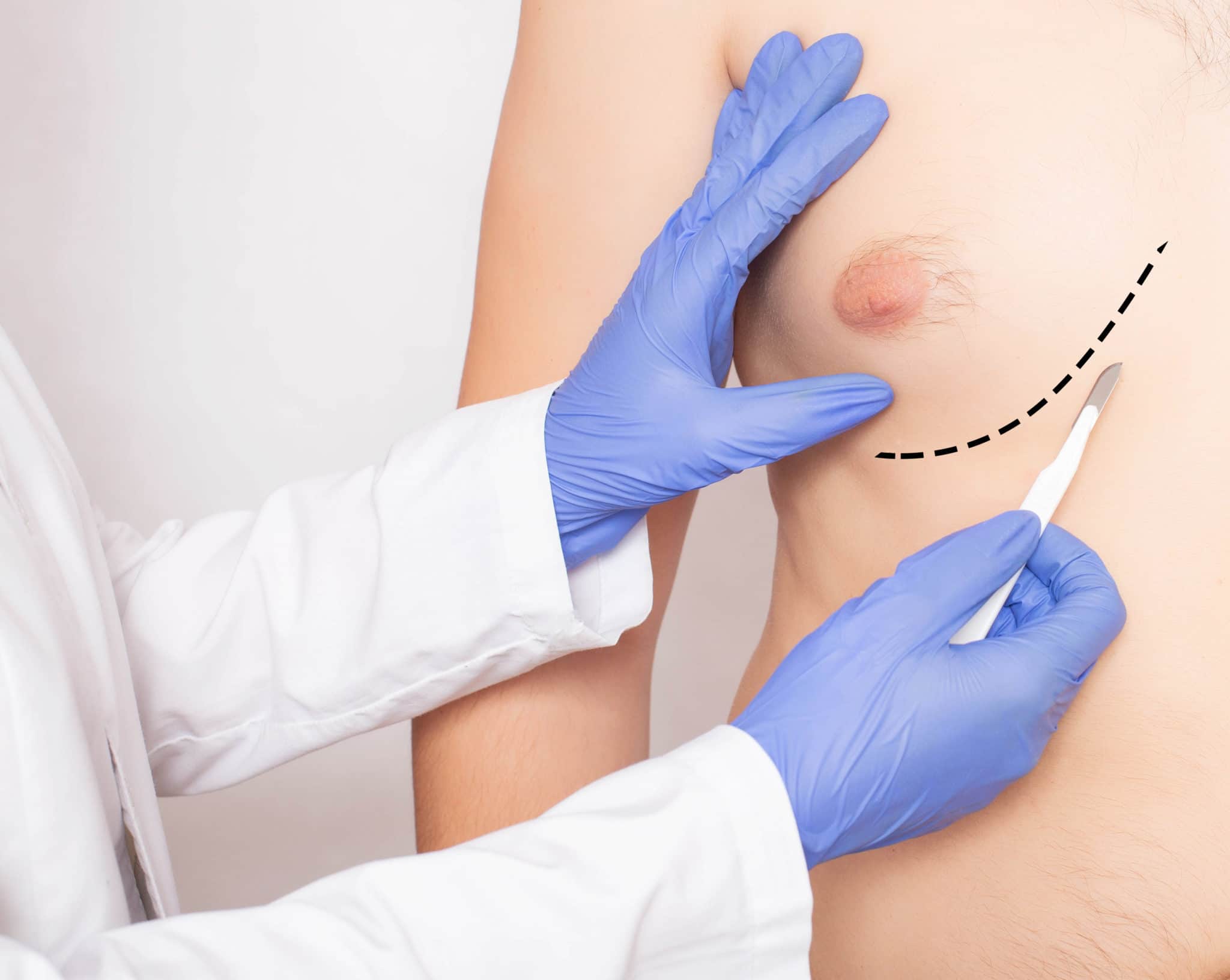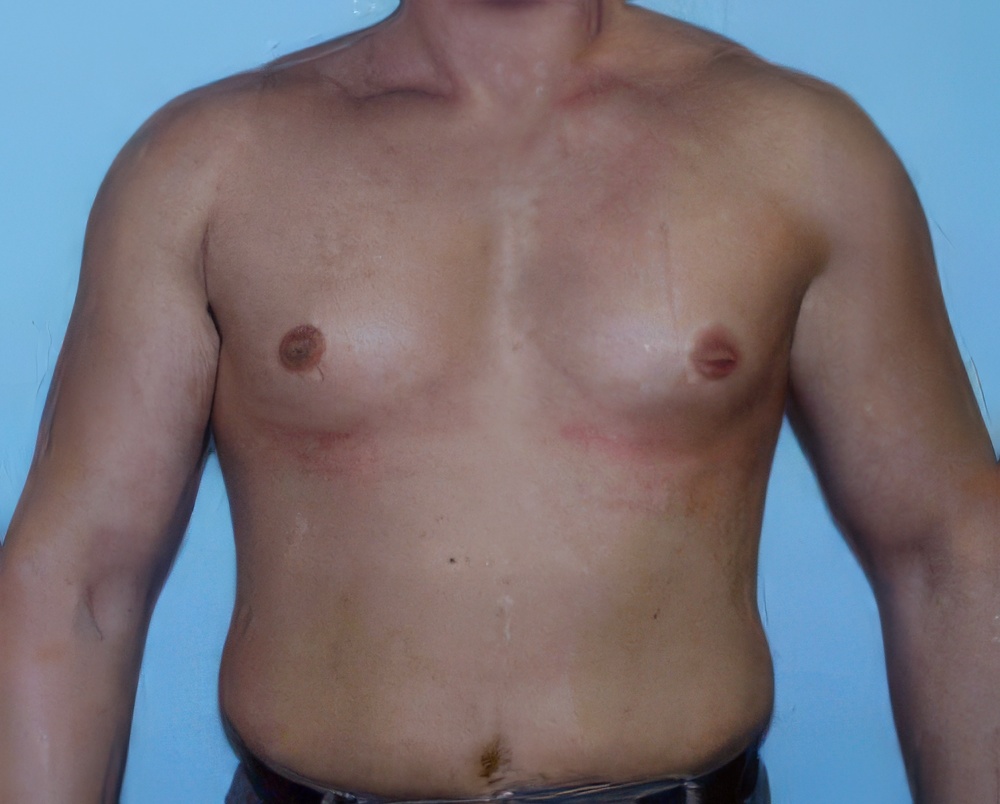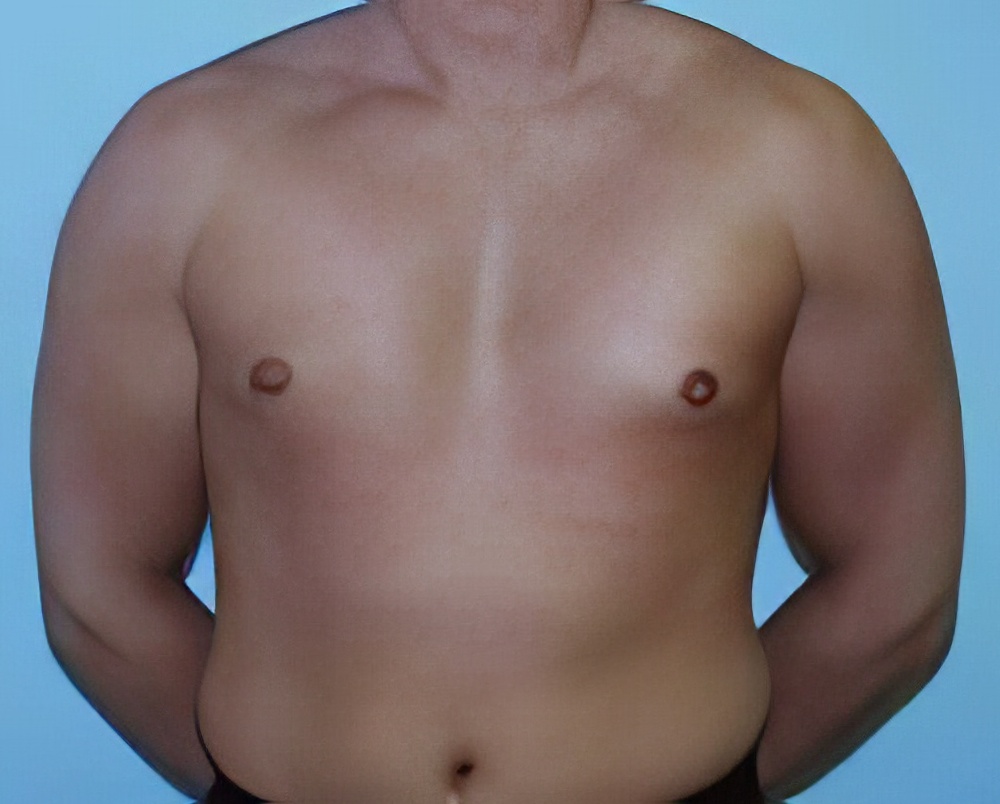If you’re a man and find yourself avoiding certain activities or clothing because of your enlarged chest, gynecomastia surgery may be the solution.
Board-certified plastic surgeons Dr. Alfonso Barrera and Dr. Eric Ruff specialize in liposuction and breast surgery techniques that can give you a more masculine chest. You can count on experienced care at West Houston Plastic Surgery in Houston, Texas.
What Is Gynecomastia?
Gynecomastia is the medical term for enlarged breast tissue in men. It develops when extra glandular tissue forms beneath the nipple, which can make the chest look less firm or masculine. The condition may affect one or both sides and often feels like a small, rubbery mass under the skin.
Surgery is the most reliable way to correct gynecomastia. Depending on your needs, treatment may involve liposuction, tissue removal, or both. These procedures create a flatter chest shape to help you feel better about your body.

What Causes Gynecomastia?
Why some men develop enlarged breasts while others do not is still somewhat of a mystery, but the condition is common in pubescent boys. It is estimated that up to 70 percent of boys have gynecomastia to some degree. In pubescent boys, the cause is the changing levels of estrogen and testosterone. Teenage gynecomastia typically resolves as hormone levels stabilize.
With adults, causation isn’t clear-cut, although hormones likely play a role. Middle-aged and older men also experience shifts in hormone levels, and that can trigger gynecomastia.
Certain medications can also cause gynecomastia, such as:
- Steroids
- Anti-anxiety drugs
- Antibiotics
- AIDS treatment drugs
- Heartburn treatment drugs
- Tricyclic antidepressants
Other causes include:
- Marijuana use
- Heroin use
- Excessive alcohol consumption
- Herbal products with tea tree oil and lavender oil (each contains estrogenic properties)
Am I a Candidate for Gynecomastia Correction?
The stigma of having larger-than-normal breast tissue can really impact a man’s self-esteem, and reduction surgery can improve self-image.
Gynecomastia often shows up as a firm mass directly underneath the nipple area. The area is sensitive to the touch and usually measures around two inches in diameter.
Unlike female reduction surgery, most cases of male breast reduction don’t require the removal of excess skin. Instead, we typically remove glandular tissue and excess fat.
If you are currently overweight, surgery will likely not be an option — you will need to lose weight first to see if this reduces your chest size.
What Are the Benefits of Having Gynecomastia Correction Surgery?
When a man has enlarged breasts, the condition can weigh on his self-esteem. A man can find himself turning down invitations to water skiing trips or beach weekends. Even mowing the yard on a hot summer day means keeping your shirt on.
That’s why these male breast reduction procedures can be nothing short of life-changing for a man who has been struggling with the appearance of his breasts.
These are not difficult procedures, but they can make a big difference in how you see your body. They can be very rewarding.
What Dr. Barrera’s Patients Have To Say
"Dr. Barrera is a knowledgeable plastic surgeon who keeps his patients’ best interests in mind during consultations. The staff is welcoming, and the office is clean and modern. I will continue to see Dr. Barrera in the future."
Male Breast Reduction Before & After Photos


What Is Recovery Like After Gynecomastia Correction?
These surgeries don’t involve difficult recovery periods. Immediately after your procedure, we’ll put you in a compression garment to minimize swelling and to help the chest adhere to its new contour. The incisions are small, and they heal relatively quickly. There will be some swelling and discomfort, but this doesn’t last very long. You may have some loss of sensation in the area, but this usually returns.
Is Male Breast Reduction Surgery Permanent?
Some patients wonder if they’ll need this surgery again later on. True gynecomastia, versus enlarged breasts due to weight gain or other lifestyle factors, is caused mainly by excess glandular tissue.
In male breast reduction surgery, we remove most of the mammary gland, leaving enough to support the nipple-areola. With this tissue gone, the chances of recurrence are very low.
However, if the gynecomastia was due to the use of steroids, marijuana, or other medications, it is possible for your breasts to become enlarged again if usage is continued. Also, a sizeable increase in weight can allow fat to accumulate in the breasts, although this isn’t true for gynecomastia.
If you want to maintain your new chest contours, you’ll want to stay at a healthy weight and moderate your alcohol or marijuana use. You would also need to fully stop any steroid use, as enlarged breasts are a direct side effect.
Why Choose West Houston Plastic Surgery?
Dr. Alfonso Barrera is double board-certified in Plastic Surgery and Otolaryngology and has been practicing in Houston since 1985. In addition to his private practice, he serves as a Clinical Assistant Professor of Plastic Surgery at Baylor College of Medicine and is internationally recognized for his contributions to plastic surgery innovation and education.
Dr. Eric Ruff, a Houston native, is board-certified in Plastic Surgery and completed a rigorous integrated residency, gaining experience at some of Texas’s leading hospitals and medical centers. His advanced training and special interest in aesthetic surgery bring patients the latest techniques in body contouring.
Together, Dr. Barrera and Dr. Ruff perform gynecomastia correction in a fully accredited surgical facility, combining safety and precision to help patients feel great about their results.
Frequently Asked Questions
These are not difficult surgeries. For most male breast reduction procedures, the surgery takes between 90 minutes and two hours.
We perform these outpatient procedures with only IV sedation and local anesthesia. This provides added safety and faster recovery. Most patients are able to go home within an hour from the end of the one-to-two-hour procedure with minimal discomfort.
It’s unfortunate that more men who suffer from enlarged breasts don’t have surgery to correct the problem. The surgery and recovery won’t impact your life for very long.
After the first week, you can return to light exercise, such as walking. Strenuous exercise needs to wait for a month or so. But you’ll quickly be able to return to work and regular activities.
You will likely need to avoid any exercises that target the chest for up to six weeks.
These are low-risk procedures. This is even more the case with a board-certified plastic surgeon such as Dr. Barrera or Dr. Ruff.
It is surgery, so there are the usual risks of excessive bleeding, poor wound healing, and infection, but these are rare because this procedure involves small incisions. The main risk is some loss of nipple sensation, but this is usually a temporary change, and the feeling returns as the affected tissues recover.
Yes, there will be small scars from the incisions made during surgery. In most cases, these are placed around the edge of the areola or in less visible areas. Over time, scars typically fade and become less noticeable.
In some cases, especially in adolescents, gynecomastia can resolve on its own as hormone levels stabilize. For adults, the condition is less likely to go away without surgery, though weight loss or stopping certain medications may reduce its appearance if those factors are involved.
Changes are visible right away, but swelling can make the chest look fuller during the first few weeks. As healing progresses, results become clearer. Most men see their final chest contour within three to six months.
Teenagers may be advised to wait until after puberty to see if the condition resolves naturally. Adults of any age can be candidates as long as they are healthy and their breast enlargement is not due to temporary factors such as medication use.
Schedule a Gynecomastia Consultation in Houston!
If you are interested in having a detailed consultation and evaluation, do not hesitate to contact our office. Call us at 713-468-5200 to schedule your consultation in Houston, Texas.
